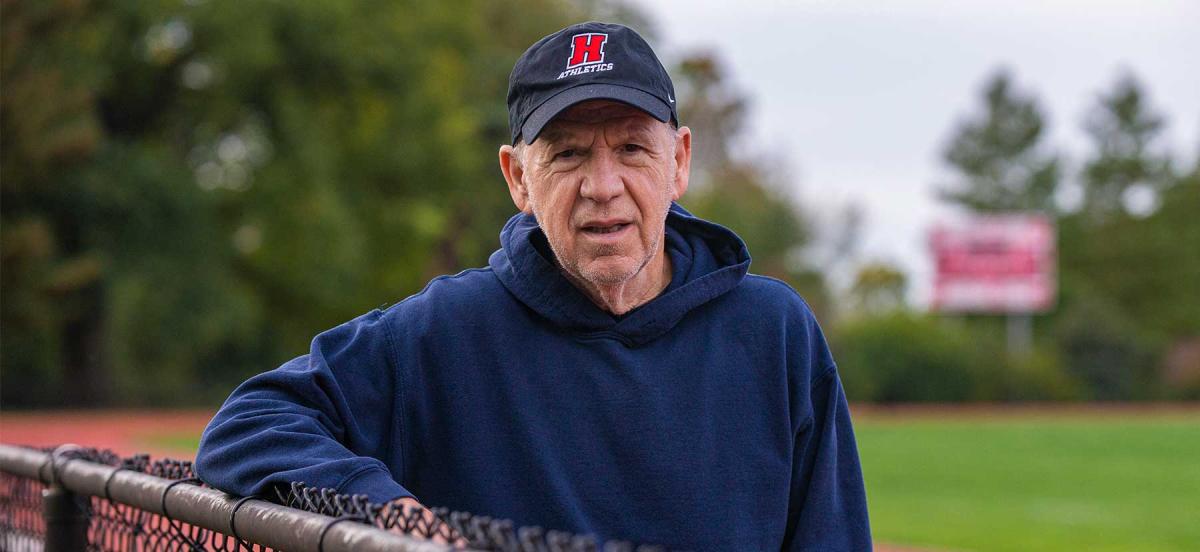Conversation With a Coach: Fran Rizzo Passes the Baton

Fran Rizzo, who retired after 32 years as the women’s cross country and track & field coach. Photo by Patrick Montero.
Details
Women's cross country and track & field coach Fran Rizzo recounts his 32 years at Haverford.
Each of Fran Rizzo’s career accomplishments as the women’s cross country and track & field coach at Haverford is more impressive than the next.
In 32 years—a number that’s incredible on its own—he coached 49 All-Americans. There were the 14 Centennial Conference titles his teams earned, and the 25 seasons in which Rizzo’s teams were represented at the NCAA Championships either as a team or with individual participants. He won Centennial Conference Coach of the Year seven times and Regional Coach of the Year on three occasions.
In September, Haverford celebrated Rizzo’s extraordinary coaching run at a festive retirement party on campus attended by quite a few of his former runners. Recently, we caught up with Rizzo, 75, to ask him about the long road to becoming a coaching legend and find out what’s next for the man who says he wants to continue to compete.
It all began with hoops. I was born in West Philadelphia in a row house and attended Catholic school at Monsignor Bonner. I played mostly basketball for Catholic Youth Organization and high school. Our team that went to the finals of the Catholic League was probably the highlight of my hoops career. It was a pretty competitive high school athletically, and most of my friends were on the cross country and track teams. They basically forced us to run cross country. I wasn’t much of a runner at the time and only ran in one or two meets.
He joined the Marine Corps out of high school. I played in the South Pacific league that traveled around the area to play during the Vietnam War. But I brought the teamwork aspect of the Marines with me to coaching. I experienced the value of the team, not just daily, but in some cases, in life or death situations. It was about mental and physical discipline, too, which we learned in boot camp on Parris Island.
He developed his love of running in his 20s. I started to jog and then decided to run marathons—I ran seven of them. Aside from the healthy aspects of running, I really liked the competition. Now that I’m retired, I’m starting to miss getting ready for the race and the competitiveness you need to succeed in athletics, and I think I brought that to my coaching. It wasn’t all about winning.
A fellow Haverford legend helped him get the job. While teaching at Devon Prep, a few miles west of Villanova, I befriended [Haverford] men’s track & field coach Tom Donnelly, who was in the same year as I was in high school and who was one of the best runners in the area and even the whole state. He told me about the job opening and after an interview, the late Greg Kannerstein ’63 hired me on the spot. In 1990, we started with about seven runners.
Sometimes, recruiting happened right there on campus. I’d walk around Haverford and say, “I’m the track coach, we’re looking for people to come out.” We’d get some athletes who were disenchanted with the sports they were playing. I picked up probably 10 runners that way throughout the years.
The Haverford work ethic was the key to success. We had a policy that if you wanted to be on the team, you had to practice and be committed. We didn’t have a standard you had to hit in terms of mile times or shot-put throwing. If you want to be on the team, give us your commitment and we’ll coach you. Whether they were runners trying to get personal records or to be All-Americans, they had that work ethic in the classroom, and a lot of that translated into setting goals. If the kid was in the lab, she was working hard, and then she was working hard on the track.
Coaching cross country and track meant focusing on both individuals and the team. I worked on getting kids to believe in themselves. But it’s also reminding them that this is a team sport, and we have to rely on each other. Whether you’re in the top-five scoring or just coming out every day and working hard, that becomes contagious. Just this past year in the regional championships, we had the two top finishers in a race. And then we had our fourth- and fifth-place runners who ran personal records. If they hadn’t done that, we wouldn’t have won regionals. If you’re coming out and working hard every day, you’re as valuable as the top runner.
It’s time to move on ... but the competitive spirit lives on. I decided to retire because I wanted to spend more time with my family. When you’re coaching indoor and outdoor track and cross country for three seasons over 32 years, it’s a lot of sacrifices. I’ll continue to jog and try some road racing—you’re kind of running with nature and you have to concentrate more on the track itself. I have a group of guys my age, we meet once a week and do some workouts. I want to stay competitive as long as I can. It’s hard to let go of that.



